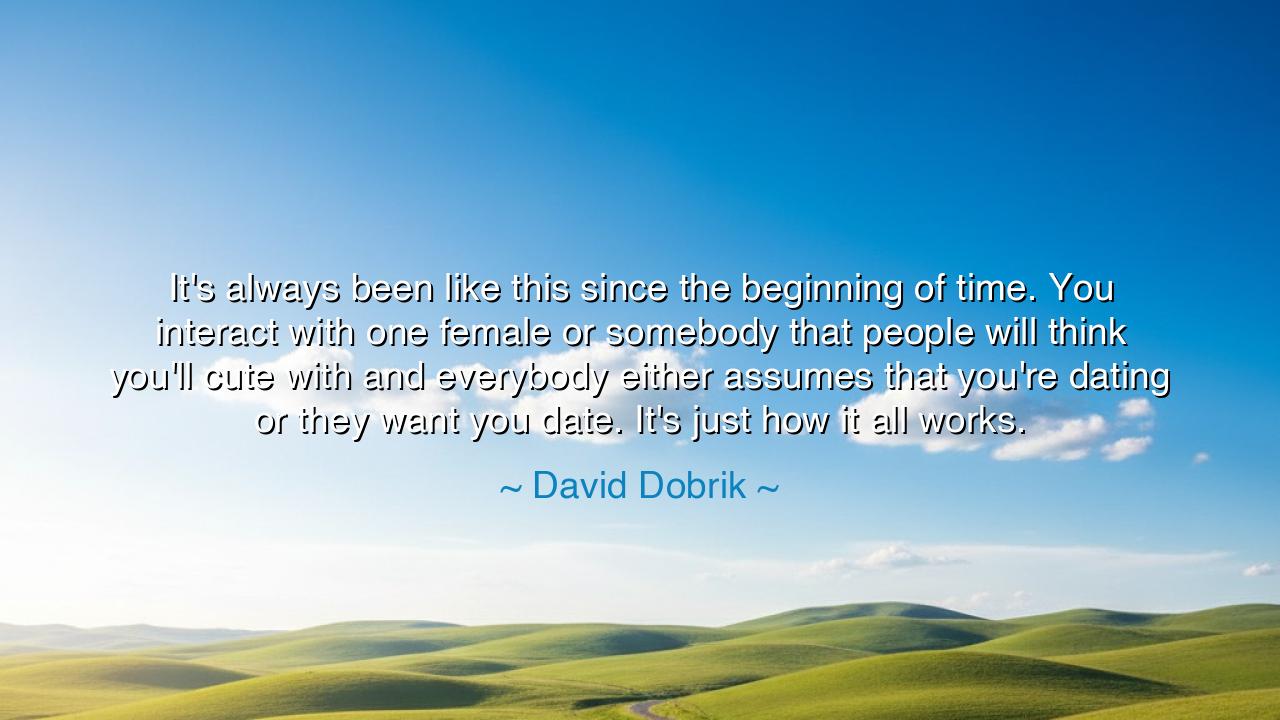
It's always been like this since the beginning of time. You
It's always been like this since the beginning of time. You interact with one female or somebody that people will think you'll cute with and everybody either assumes that you're dating or they want you date. It's just how it all works.






In the observant and almost weary words of David Dobrik, the creator who lives beneath the ceaseless gaze of the public, we hear both humor and lament: “It's always been like this since the beginning of time. You interact with one female or somebody that people will think you're cute with, and everybody either assumes that you're dating or they want you to date. It's just how it all works.” Though spoken casually, these words reveal an ancient and enduring truth about human perception, projection, and the eternal dance between reality and rumor. Beneath the laughter of his tone lies the quiet wisdom of one who has seen how easily the imagination of the crowd can turn mere friendship into legend.
David Dobrik, a figure shaped by the modern world of fame and the glowing screen, speaks from the heart of an age where visibility is both a blessing and a burden. Every smile, every glance, every shared moment becomes magnified through the lens of others. But what he describes is not merely the curse of celebrity—it is the condition of humanity itself. From the earliest dawn of civilization, when firelight illuminated the first gatherings of people, the minds of men and women have always sought stories. We look at connection and weave it into romance; we see companionship and imagine desire. For as long as hearts have beaten, we have longed to see love, even where it may not exist.
The ancients understood this well. In the temples of Greece and the courts of Egypt, whispers of affection followed those who worked closely together, whether rulers or servants, scholars or warriors. The poet Ovid, in his Ars Amatoria, spoke of how proximity breeds passion—or at least the illusion of it. The human heart, he said, is drawn not only to love but to the idea of love. When Dobrik observes that “it’s always been like this since the beginning of time,” he echoes this timeless truth: that people are storytellers first and listeners second, forever filling the spaces between facts with their own dreams and desires.
This tendency arises from our need to connect, to find patterns in the chaos of existence. When we see two people laugh together, we feel the pulse of something familiar—something we ourselves desire—and we call it love. When we watch two souls share space and light, we project onto them our longing for unity. This is not malice; it is human nature, born from our collective yearning to believe that bonds between people are more than mere coincidence. And yet, as Dobrik suggests, this very yearning can become burdensome for those who live within it, for it steals the simplicity of friendship and replaces it with the expectations of fantasy.
The story of Cleopatra and Julius Caesar, later Cleopatra and Mark Antony, illustrates this same truth through the grand theater of history. The world watched their alliances not as politics but as passion. The people could not believe that a queen and a general might speak of statecraft without also speaking of desire. Whether true or not, their names became inseparable in rumor and legend, shaped by the same impulse Dobrik names—the desire of others to see love where connection simply existed. The myth grew until it overshadowed the reality, proving that once the public imagination claims a story, even truth bows before it.
And yet, within this observation lies a gentle wisdom: that assumption and curiosity are not to be feared, but to be understood. The wise learn to walk amid the noise of opinion without being moved by it. The philosopher Epictetus taught that we cannot control what others think of us—only how we respond. So too must we accept, as Dobrik has, that people will see what they wish to see, and that in the theater of life, the audience will always write its own script. To live freely, one must learn to live beyond perception, to hold to truth even when others do not see it.
So, my children of the future, let this be your lesson: do not be trapped by the stories others tell about you. The world has always spun tales around those who dare to live openly, to laugh without caution, to walk beside others without fear. You cannot stop the whispers, but you can choose not to let them define you. Whether in friendship or love, in work or in art, stay faithful to what is real. Know who you are, and know that every human heart is a mirror—some will reflect you truly, others will distort your image. But the reflection is not the self. The truth of your soul is your own, and it does not bend to rumor or expectation.
In this way, David Dobrik’s words, though spoken in jest, carry the wisdom of the ancients: that people have always mistaken companionship for courtship, and affection for romance. It is, as he says, simply “how it all works.” But you, traveler of time and spirit, must remember that what others see is but shadow—the real light lies within the bond itself, unspoken, unjudged, and untouched by the noise of the world.






AAdministratorAdministrator
Welcome, honored guests. Please leave a comment, we will respond soon